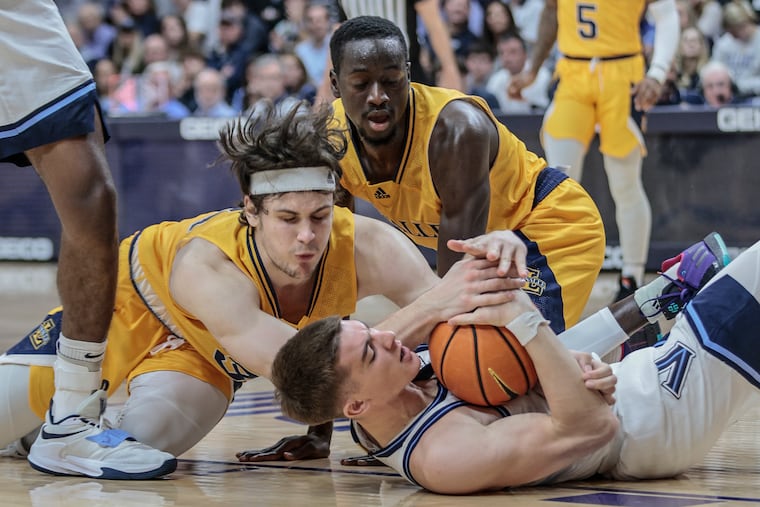Rokas Jocius, from Lithuania to La Salle, seeks to develop his game
The big Lithuanian player is instantly recognizable with his trademark headband and he is working hard to make his game as notable.

In the La Salle men’s basketball lineup, a 6-foot-10 newbie stands out above the rest while sporting a white headband. His height and noticeable accessory invites the question: Who is that?
Freshman forward Rokas Jocius grew up as a multisport athlete, swimming on the weekends and making impressive leaps on long jump competitions in his homeland of Lithuania. At 8 years old, he began playing basketball and at 11, he dropped everything else for the sport.
“Because the thing is, basketball gets the most money in my country. It’s the favorite sport,” he said.
Jocius has been developing his basketball skills in a country of about three million people — and many of those people support and watch the sport, creating a competitive environment with career options that are too good to pass on.
The Lithuanian has arrived at La Salle with a story that has more chapters to write.
His first invitation to play for a Lithuanian national team came at the age of 14 — one out of 15 players to be selected over a couple of days in a training camp. To Jocius, this was a great honor, especially at a young age, to wear his country’s name on his chest.
» READ MORE: With aspirations of returning to basketball prominence, La Salle looks to a pair of twin transfers
“From that moment on, you were just feeling that you were the best in the country because the country is inviting you to serve it,” he said.
Jocius continued to play at a high level for Vilniaus Perlas Energija — the second-highest tier of Lithuanian basketball — where he averaged 8.8 points and 7 rebounds in his opening season and recorded four double-doubles over his two seasons with the club.
Jocius also competed in the U19 FIBA World Cup, and both experiences proved to be valuable for his game and development.
At the World Cup, in his own words, he “underperformed.” Throughout the preparation process and the tournament, he was having problems with his feet. The team kept him in the rotation, but Jocius didn’t rack up many minutes. He played a different game than he wanted to — a mental one.
Despite his injury issues, Jocius persisted. “I just still kept on. ... I wish I would have been healthy, in my opinion, then it would be a different story,” he said.
Since late July, Jocius has been living away from his family. It’s not a first for him. For Jocius’ final two years living in his home country, he was playing in Vilniaus, which is an hour away from his hometown of Kaunas. Still, an hour by Lithuania standards is traveling across about third of the country.
“So, it’s far. In the American standards, I think it’s nothing,” he said with a laugh.
At 14, he had already started to think about what it would be like to play basketball in the NCAA and professionally. The idea of getting an education while playing basketball appealed to Jocius. If he stayed in Europe, he would not have had that opportunity.
“The thing is, you never know what’s going to happen,” Jocius explained. “Maybe you’re going to get injured so bad that you never play basketball again, or some other circumstances. So, you kind of have to have a plan B.
“I thought it was the best opportunity for me.”
Jocius still hopes to play professionally down the line. Matching up against the best in the college game is key to that plan. Villanova’s Eric Dixon was a tough first test, but the freshman held his own on the court.
La Salle coach Fran Dunphy didn’t expect this effort from Jocius right out of the gate in the opening game against Villanova on Nov. 7.
“One of the things he did was he walled up against Dixon very well,” said Dunphy at the postgame press conference. “We were talking about that: Is he ready to go? It’s a tough environment to be in, but I think he’s going to be a really good player.”
Jocius has transitioned well to the game since coming to Philadelphia and has learned his way around the biggest adjustment, in his opinion, which is the added shot-clock time from FIBA’s 24 seconds. He has played in nine games, averaging 5.8 points with a .522 field-goal percentage. This season, Jocius plans to focus on being the best version of himself and giving his best effort toward his new team.
“If I give a good effort, there’s always a greater chance that we’re going to win a game,” he said.